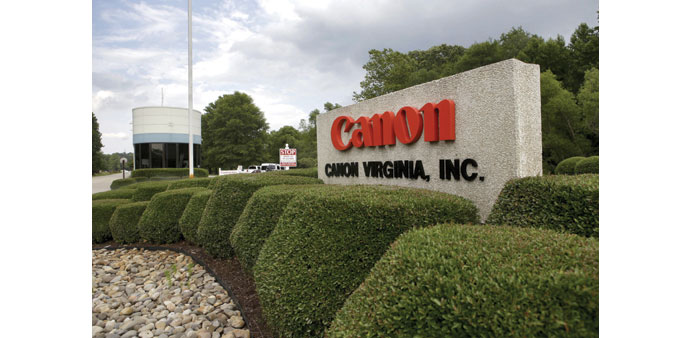Canon, which made a cash bid to purchase Sweden’s Axis Communications last month for $2.8bn, has no bonds due and the Japanese camera maker had $7.1bn in cash and near-cash items at the end of last year, according to data compiled by Bloomberg.
Bloomberg
Tokyo
Japan loan rates near record lows and an unprecedented cash pile are spurring acquisitions by companies from Canon to Japan Post Holdings. The trouble for Prime Minister Shinzo Abe is the targets are mostly overseas.
Firms including Asahi Kasei Corp have announced about $15.4bn in deals abroad this month alone, the most since Suntory Holdings released details of its bid for whiskey maker Beam Inc in January 2014. The nation’s average new loan rate was 0.936% in December, 17 basis points from the least on record, Bank of Japan data show. Cash and equivalents at members of the Nikkei 225 Stock Average rose 16% to 4,025 yen per share at the end of last year, the highest in at least 15 years, according to data compiled by Bloomberg.
While Japan’s largest companies have enjoyed record profits under Abe, they’re using those earnings to fund takeovers abroad, making it harder for him to achieve his goal of boosting the world’s third-largest economy. Asahi Kasei, a chemical maker, said this week it will buy the US’s Polypore International Inc for net $2.2bn and will use cash on hand and bank loans to finance the deal.
“Abenomics is all about getting companies to invest at home and boosting local wages, so going overseas is contrary to the government’s goal,” said Tsutomu Yamada, a market analyst at Kabu.com Securities Co in Tokyo. “What is right for individual companies isn’t always right for the Japanese economy.” Salaries adjusted for inflation have dropped for 18 straight months as Abe and central bank Governor Haruhiko Kuroda pump record stimulus to reflate the economy and spur price gains. After two decades of stagnation, businesses have been slow to boost pay for workers who are struggling with a sales- tax increase and the reemergence of inflation.
Japan’s top labour union association said this week it will seek the biggest increase in monthly wages in more than two decades as it makes the higher cost of living the key point in annual spring pay negotiations. The Japanese Trade Union Confederation, known as Rengo, will call for a bump of more than 4% in monthly pay, excluding overtime and bonuses, said the group’s president, Nobuaki Koga.
The median debt-to-earnings ratio at companies in the Nikkei 225 fell to 2.92 times in the quarter ended Sept. 30, the lowest since 2011, data compiled by Bloomberg show. The members of the gauge are forecast to post record profits this year, as exporters have reaped gains abroad on the back of a 27% drop in the yen versus the dollar since the end of 2012.
Bank loans are cheaper for companies than bonds now, Reiko Hayashi, the head of capital markets at Bank of America Merrill Lynch in Tokyo said in an interview this month. “M&A-related fundraising will remain strong,” she said.
Lending rose 2.6% in January from a year earlier after increasing 2.8% in November and December, the fastest pace since 2009, according to BoJ data.
Several of the Japanese companies engaging in purchases abroad have no outstanding notes or haven’t issued publicly traded debt since Abe’s return to power at the end of 2012.
Canon, which made a cash bid to purchase Sweden’s Axis Communications AB this month for 23.6bn krona ($2.8bn), has no bonds due, according to data compiled by Bloomberg. The camera maker had ¥845bn ($7.1bn) in cash and near-cash items at the end of last year.
Otsuka Holdings Co, a Japanese pharmaceutical company, and Kintetsu World Express Inc, a distribution company, both of which have announced billion-dollar acquisitions since December, have no outstanding notes. Otsuka Holdings will consider long- term debentures to refinance a bridge loan use for its purchase, it said in December.
Asahi Kasei hasn’t issued bonds since 2012 and said it doesn’t plan to sell debt or stock to finance the acquisition.
Corporate note sales this year excluding SoftBank Corp have dropped 43% to ¥583bn. SoftBank, which acquired Sprint Corp, the US’s third-largest carrier, offered ¥450bn in debt to individuals last month.
Hitachi Ltd said it will pay ¥773mn ($877mn) for Finmeccanica SpA of Italy’s 40% stake in rail company Ansaldo STS SpA, and buy the remainder of the company in a mandatory tender offer. The Stoxx Europe 600 Index has climbed 14% in the past year.
“For the Japanese economy, it would be better if companies invested at home,” said Kabu.com’s Yamada. “Global stock prices are at highs, so there is a big chance they are buying at the top of the market.”

